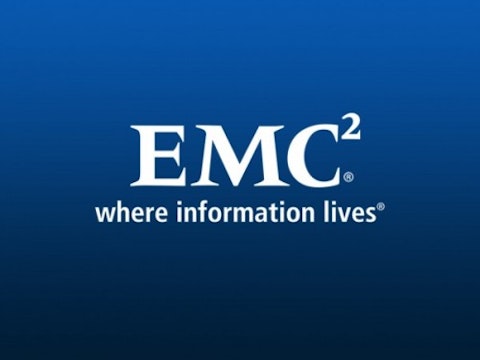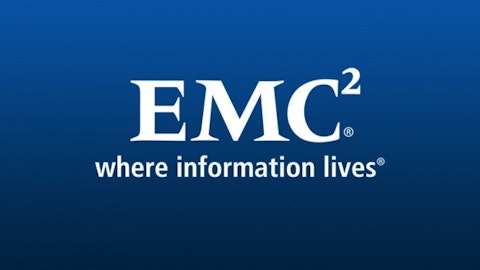In a world where more and more data is produced, storage needs will increase constantly, both in the personal and enterprise segments. As a result, those companies dealing with data storage and handling seem poised to deliver strong growth rates in the upcoming years. However, nowadays, several ways to stow information exist and some firms look more prepared for the future than others. EMC Corporation (NYSE:EMC), Seagate Technology PLC (NASDAQ:STX) and Teradata Corporation (NYSE:TDC) are three companies in the data storage industry that offer interesting business models and deserve a closer look in order to elucidate if they stand as worthy investments or not.
In the years to come, cloud computing and Big Data initiatives are expected to drive revenue growth (Zacks) as EMC Corporation (NYSE:EMC) stands in an advantaged position to benefit from the expansion in demand to occur over the next several quarters. Several strategic alliances have and will most likely continue to contribute to expansion. Trading at only 20 times its earnings, a 46% discount to the industry average valuation,while offering compelling growth prospects, a strong balance sheet, a bulky cash mattress andnow even paying out dividends, I’d recommend BUYING EMC Corporation (NYSE:EMC)’s stock.
Seagate: The primary hard-disk drive player
Seagate Technology PLC (NASDAQ:STX) is a leading manufacturer of Hard Disk Drives (HDDs), holding over 40% of the market share. However, although HDD sales remain dominant in the storage space, the firm’s long-term success seems to rely on its capability to transition into the production of newer technologies, like Solid State Drives (SSDs) and other Flash-based memory products. In the short-term, analysts expect revenues to be driven by a shift to higher-margin enterprise drives that offsets a slower PC and Laptop market demand (Deutsche Bank).
Nevertheless, Seagate Technology PLC (NASDAQ:STX)’s uncertain future andno EPS growth expected over the next years counterbalance its cheap valuation, at only 6.8 times its earnings, making it stand as a HOLD case, even despite the growth opportunities provided by developing countries with price sensitive consumers which will most likely continue to choose the much cheaper HDD technologies over newer, and about 10 times more expensive, SSDs. Meanwhile, declining HDD prices will continue to exert pressure over the firm’s margins, obliging it to maintain innovative and cut costs in order to keep earnings levels up. Consumer concentration is yet another concern for investors, as HP and Dell accounted for about 30% of last year’s total revenue; risks are high and so is the stock’s volatility, expressed by a 2.99 beta.
So, even in spite of consensus beating quarterly results,several analyst upgrades and a jump in its stock price, I will have to agree with Craig-Hallum’s Christian Schwab: at over $43 per share, I would wait for a better entry point if considering to invest in Seagate Technology PLC (NASDAQ:STX). Furthermore, aggressive insider sales dissuade me even further from buying this stock.
Setting aside the headwinds and long-term threats, the firm’s 3.53% projected dividend yield and strong margins, returns and growth figures make this firm worth keeping an eye on, particularly as the second half of the year unfolds and shows the future of the PC and laptop demand.
Teradata: A data warehousing provider
Teradata Corporation (NYSE:TDC) is the world’s largest enterprise data warehousing provider, and its portfolio also includes enterprise analytic technologies and services. Although newer database and analytics technologies are arising, I would still recommend BUYING this stock as the company’s high-end products and high switching costs for its customers provide it with an economic moat to keep competitors lagged and help the firm retain clients –including Apple, Wal-Mart and eBay, amongst many others- going forward. Meanwhile, its stock price has been experiencing a downtrend over the last few months, providing an attractive entry point for investors; trading at 24.6 x P/E, a 33% discount to the industry average, while offering great margins and returns (see table below), strong financials, an EPS growth forecasted at 13.6% per annum over the next five years and a history of growth backing its prospects, this is a value stock you should miss on.
Moreover, as data volumes increase, Teradata Corporation (NYSE:TDC) should benefit from higher data analytics corporate budgets, mainly because big companies have increasingly “valued operational data as a strategic asset […] to drive supply chain efficiencies, manage inventory, enhance customer service, and shorten sales cycles” (Morningstar). New strategic partnerships and strengthening relationships with large customers -like Microsoft, eBay, Oracle, IBM, AT&T, Best Buy and P&G, to mention a few- should also provide plenty of upside for the longer term. Furthermore, its strong balance sheet and cash position will serve for future acquisitions, a strategy that has proven highly profitable in the past.
Bottom line
Both EMC Corporation (NYSE:EMC) and Teradata Corporation (NYSE:TDC) are fairly moated companies that offer not only compelling stability, but also attractive and sustainable growth expectations. Trading below average valuations while having a bright future ahead of them, these are two investment opportunities that look too attractive to pass on. Seagate Technology PLC (NASDAQ:STX)´s case is a little different: dominating in a soon to decline industry, its short and medium-term outlooks seem promising, but its longer-term viability and profitability seem quite questionable.
The article 3 Data Storage Companies You Shouldn’t Miss originally appeared on Fool.com and is written by Damian Illia.
Damian Illia has no position in any stocks mentioned. The Motley Fool recommends Teradata. The Motley Fool owns shares of EMC. Damian is a member of The Motley Fool Blog Network — entries represent the personal opinion of the blogger and are not formally edited.
Copyright © 1995 – 2013 The Motley Fool, LLC. All rights reserved. The Motley Fool has a disclosure policy.





